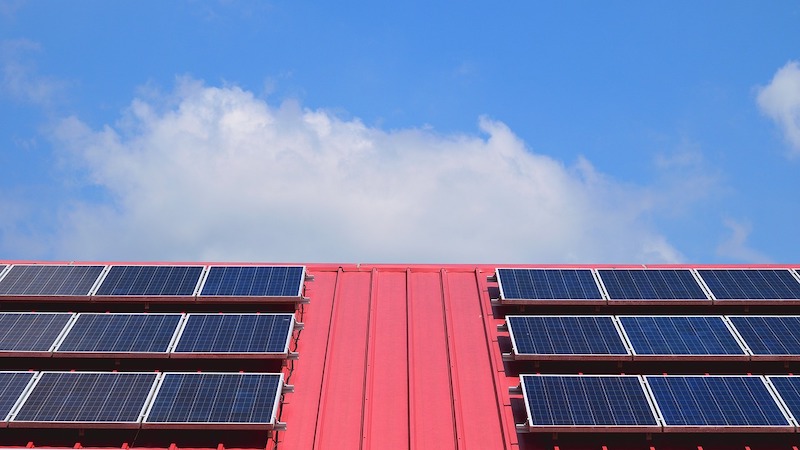A new bill introduced in the Massachusetts Legislature would require that rooftop solar be included on new residential and commercial building projects.
Modeled after a similar policy in California, the bill would provide some exemptions. If the roof is too shaded, if a solar hot water system or other renewable energy technology is installed, or if the building has a green roof, it could be exempted. Affordable housing developments could also obtain exemptions.
According to the bill, amendments to the state’s building code would ensure that roofs are strong enough to support solar panels, that available roof space is maximized, and that buildings can make room for solar infrastructure. Single-family homes would need to produce enough electricity via solar each year to meet 80% of the average demand for similar houses. The state would set minimum solar energy system requirements for other buildings.
A report from an environmental advocacy group found that such a mandate would add more than 2.3 GW of solar capacity by 2045. That’s close to Massachusetts’ current total installed capacity, including utility-scale solar, of about 2.9 GW.
Related Stories
| Apr 19, 2012
Michigan legislature tackling controversial rules on electricians
A fight is brewing in the Michigan legislature over how many fully qualified electricians must be present during electrical work when apprentices also are on hand.
| Apr 19, 2012
Washington city may base building code on rising sea level due to global warming
Aberdeen may become the first city in Washington to base a building code on rising oceans and global warming.
| Apr 19, 2012
CSI webinar on energy codes and building envelopes
This seminar will review recent changes in energy codes, examples of building enclosure wall assemblies for code compliance, potential moisture management and durability challenges, and design tools to assess and minimize potential problems.
| Apr 19, 2012
Innovative plan for storm water in Philadelphia gets EPA’s OK
Philadelphia's $2 billion plan to manage its storm water with green methods including porous pavement, green roofs, and more trees, was officially approved last week by the U.S. Environmental Protection Agency.
| Apr 19, 2012
LEED 2012 to include new credit category for transit-oriented development
The updated LEED 2012 system will introduce a new credit category, “Location and Transportation,” to encourage development oriented around public transit and more walkable communities.
| Apr 17, 2012
FMI report examines federal construction trends
Given the rapid transformations occurring in the federal construction sector, FMI examines the key forces accelerating these changes, as well as their effect on the industry.
| Apr 16, 2012
University of Michigan study seeks to create efficient building design
The result, the researchers say, could be technologies capable of cutting the carbon footprint created by the huge power demands buildings place on the nation’s electrical grid.
| Apr 13, 2012
Congress’s action doesn’t mean Pentagon can’t build LEED gold structures
Though Congress passed a defense budget preventing the Department of Defense from spending money to achieve LEED gold or platinum certification, the Pentagon may still end up constructing buildings to those standards.
| Apr 13, 2012
International Living Building Institute certifies first two Net Zero Energy buildings
A community building in Oregon and an office building in California are the first two projects to earn net-zero status under the International Living Building Institute’s Net Zero Energy Certification program.
















